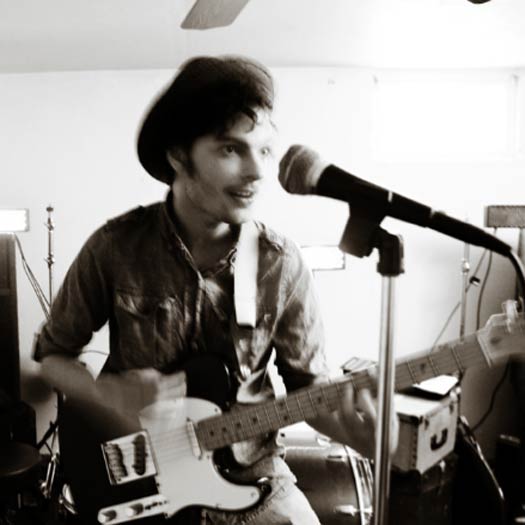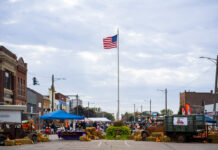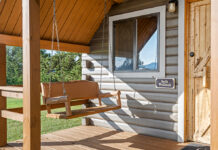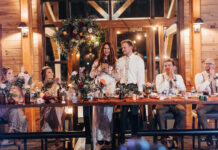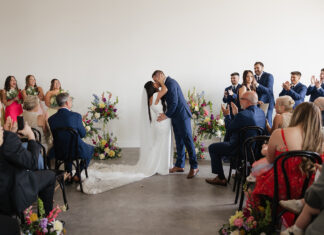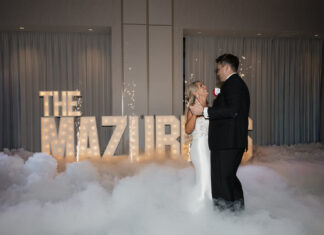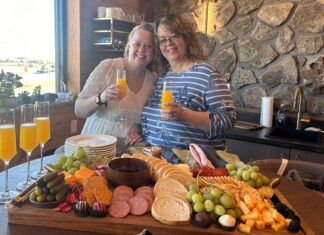Image by Studio Blu Photography.
The first annual 605 Summer Classic, presented by Sanford Health and Wells Fargo, looms near. Discontent to be confined to the page, 605’s mission to unite and promote Sioux Falls in general (and its young adults in particular) has manifested into an all-day experience designed to showcase the spectrum of independent music created by our peers, allies and neighbors. Slated to be situated in the parking lot of the stylish 8th & Railroad Center, the Summer Classic will go down on August 14 running from 2 to 11:30 p.m. In addition to the plethora of local music, The Sioux Falls Roller Dollz will have their first-ever outdoor bout at the event.
In an effort to glean some insight at the momentum building for the Summer Classic, I sat down with members from each of the eight groups fated to rock the parking lot — Erin Toft of the sensuous, confidently sparse A Ghostwood Calm; Tom Weismantel of the techy, poppy Welcome to the Cinema; Bryan Wehrkamp of the ambient, sonically satiating Avian Sunrise; Paul Tims of the acoustic, Mellencampesque Nick Rallis Band; V the Noble One, a rapper known for his driving, deliberately delivered lyricism who will appear with Trey Lane and AdApt (all representing Flame On Entertainment); Eli Show of the melodic, chaotic We All Have Hooks for Hands; Billy Yost of the hooky, engulfing Chicago-based expats The Kickback; and Corey Gerlach of the infectious, effervescent hip hop outfit Soulcrate Music. I was curious to learn what the Sioux Falls music scene looks like to such an assorted group of young artists—what they like about it, whether they think we’re on the right track, and what can be done to make it as much as we imagine it can be.
Denise: What’s good about music in Sioux Falls?
Billy: The Rubber Gloves and all the work The Collective Efforts Union puts into trying to generate interest in local groups.
Bryan: I like the Sioux Falls scene because it’s really diverse. There’s not really a particular sound. Every show you go to there’s gonna be a decent draw to it. For the 605 Classic, they’ve put together a very diverse group. You have something for everyone. You have hip hop, indie rock, piano rock…I like the Sioux Falls music scene. It’s tough at times. It jumps up and down, but it’s pretty cool, I think.
Paul: It seems like a lot of bands in the area aren’t just punk rock or acoustic rock or hip hop. Since we’re a small community- a small circle of friends- we rub off on one another.
V: My answer changes daily. What I like about the scene right now is that it’s hard. If you’d asked me two weeks ago, I’d probably be complaining about how it’s hard. I like that it’s hard, particularly for rap, because I’m not East Coast-bound anymore. I’m not Southern-bound or West Coast-bound. Here you really have the opportunity to make the best, most creative music that is influenced by all of those things, but not in a box. Because it’s so hard here, because there’s not as much fanfare, because we have to work so much harder, I find that when we go to other cities they’re blown away by what we do. That’s because, quite honestly, their people don’t work as hard. Their people don’t entertain as much. They just get up and play. You really have to put it in. This is a good training ground. When we go other places, it shows.
Eli: That’s true. You have to bring it. It’s interesting, being from the Midwest. You’re not from a place that everyone knows. You’re not from New York. No one knows what you’re gonna do when you get onstage. There’s no preconceived notion, so you have the opportunity to actually take them.
Tom: I’m with you guys. What I like about the scene is that it seems really young still. Like there’s constantly new evolutions popping up. I feel like this is a shameless plug, but 605 Magazine and those kinds of things seem really new to me, and it doesn’t seem like it’s been overly established. It doesn’t seem like it’s going to judge you too rapidly or anything like that. As long as you bring it, you can get established around here.
Corey: I think the thing that is most distinctive about our scene is that everybody’s just friends. The bands even are friends as bands, because they enjoy playing together. Erin’s a prime example. You’ll see her play sometimes with a few different groups in one night or over the course of the weekend. If you’re going for the whole community thing, friendships are strong. I think people support each other a great deal here even though we don’t have the largest music scene by any means. I think we’re supportive of each other.
Erin: I was thinking exactly the same thing, but I’ve noticed that while we’re all kind of friends in this musical community, the music has changed a lot. Right now I’m playing with Tim Jewell and Friends, but when I first met Tim Jewell he was playing in a metal band. Now we’re playing folk music, so it seems like our tastes are starting to mature and we’re all into the roots music, but it all stems from one central place…
Corey: We all started as friends in the all-ages punk scene…
Erin: Basement shows starting in the mid-‘90s. We’ve been going to these things for a long time. Everybody’s developing and going in their own directions, but they’re also able to appreciate what everybody else is putting out there.
Corey: We all go to each other’s shows, regardless of what style of music it is.
Erin: That’s one really nice thing that we’ve noticed here. People from your group go to shows that no one would think they’d be into, but regardless if they are or not, they’re there to be supportive.
Denise: What does the future hold for the Sioux Falls music scene and what challenges stand in the way?
Corey: I see it going through five more venues in the next five years. Up and down. I don’t know. It’s hard to tell. Sioux Falls is one of the fastest growing cities in America. You just never know. What I’d like to see are more young people, more young bands coming up. I feel like we’ve lost that a lot. I think about when we were growing up and it seemed like everyone was starting a new band every week. I don’t know exactly what happened, but I think technology ruined us in a sense. It’s like people think, ‘Why make music when I can just take it all the time and have such access to everything?’ People don’t tend to work together to make music together anymore for some reason. I’d just like to see more young kids coming up- bands or groups or whatever- but just involved in it at a younger age.
Paul: This generation of kids coming up are saying, ‘I’d rather play Guitar Hero than learn how to play guitar. DIY is too much work.’
Eli: We need younger kids. I mean, we’re all the same age. I don’t know one little kid band out there. Bring the kids. Tell them they can do it.
Erin: I think we need that, too, because we all play a lot of 18+ shows and the only venues that we seem to have in this town are bars. We don’t get to see young people’s groups. Whether they’re happening or not, kids don’t get to play most venues, because they can’t get in.
Corey: That’s why the Summer Classic is such a great thing. It’s all age for the family—and I can still have a beer.
Paul: It would be good to have a couple more venues that are all ages. I think every time we’ve played in Sioux Falls, it’s been 21+. I used to be a teacher and the kids that I taught couldn’t come and watch us play.
Corey: It’s unfortunate, but the only way we can pull off all-age shows is to put tons of money into them. There is so much overhead cost that you can’t afford to do it, because you’re paying for the production, you’re paying for the space, and you can’t charge fifteen bucks to a bunch of 14-year-old kids. You want to charge five bucks, but then you end up not making back the amount of money that you put into it.
Denise: How can we change the scene for the better?
Erin: We need a Miss Havisham to come in and fund it. C’mon [T.] Denny Sanford. This is your opportunity.
Corey: I’ll give you a statue. I’ll build it myself.
Paul: I thought I’d start a relationship with Lady Gaga.
Corey: Then it’d be more of a circus than anything.
Billy: Appoint August ‘Instrument Awareness Month’ and bomb 1994, because general public apathy in regard to bands who play their instruments and continuing comparisons to "the scene" in 1994 is outstandingly unproductive.
Eli: Sioux Falls is kind of the challenge. The city doesn’t like us. They’ve never liked us. They shut down The Pomp Room, then we moved to smaller shows—The Actor’s Studio, KC Hall…thank god for Nutty’s. I think it’s a good home right now, but for a long time, we couldn’t do all-age shows. How are you gonna bring up kids in a scene if you don’t let them see the music? Someone has to tell kids…I mean, we all started sucking at guitar, but we got up onstage and did it anyway. Thank God they did that vote. We can have 18+ shows now. We can have all-age shows, finally. I think it’s one of the most important things. A show isn’t just an event to get drunk at. It’s an event to enjoy music.
V: I’ve noticed that there’s more listeners than fans. On the whole, listeners are the ones who come to your show and you’ll maybe see them not move the entire time. Then, when you get off, they’ll be like, ‘I loved that! That was great. I love what you do.’ Then you’re saying to yourself, ‘Then why weren’t you doing anything?’ It’s because they’re not fans. They’re not fanatics for music. Like me, if I go the whole day without listening to something, it’s a problem—like not having my coffee or something. It’s not like that for a lot of people now, because everything’s so manufactured. Musically, it’s tough. I’m 29 and musically that makes me one of the elder statesmen—definitely for rap around here. We’ve gone through the cycle so many times. Like when I was originally with The Noblemen, then we became The Young Nobles, then with Flame On and then with Trey [Lane]. You know, trying to help him skip those things I had to go through is one of my proudest things—helping him avoid some of the nonsense. It was like we had to lay brick. We had to build the house that we live in.
Tom: We’ve been a band long enough to see the comings and goings of fan bases. One show will be packed and then the next one, there’s nothing. The town seems to lack a consistent fan base of people who like music for the sake of liking music. You hate to have the same 30 people come out, because they’re your groupies or whatever. It’d be really nice if Sioux Falls had a group of people who were passionate about going to shows and that kind of stuff, but there doesn’t really seem to be that.
Bryan: I’ve even noticed, in the year and a half that we’ve been a band, we’ve had really big shows and then the next one is like, ‘Whoa, I thought we were gaining ground here.’ I think that’s kind of what comes with the Midwest.
Tom: I think Sioux Falls is small enough that if you keep improving and pushing limits, you can get pretty established in this area and start drawing a good crowd.
Eli: We have to make them want to come and see shows. You know, start doing bigger things. Have more bands, so it’s not like ‘We’ve listened to these guys twenty times already. We don’t care.’ As older bands, we have to keep getting better and better.
Tickets for the 605 Summer Classic can be purchased for $10 at the 41st Street Ernie November, Last Stop CD Shops, or online at The Collective Efforts Union Web site, www.collectiveeffortsunion.com. Tickets will be $12 at the gate. To listen to audio, watch the performers in action or get more information on the event, check out www.605summerclassic.com.


